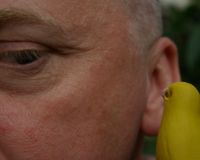Posted on Thu 26 May 2016
Pace in Development and Performance
I’ve spent a lot of time this week thinking about and discussing pace and timing in magic performance. This comes partly from the struggle I had with the Science Showoff performance because it was only 9-mins and that isn’t enough time for IdeoBird to be explained. Explanation is important in…

Posted by
Project

Magician in Residence: Stuart Nolan
Meet Stuart Nolan's new pet the IdeoBird, a magical, mindreading creature. Held gently in your palm, the IdeoBird can sense the small subconscious movements of your hand and arms and so divine your secrets.I’ve spent a lot of time this week thinking about and discussing pace and timing in magic performance. This comes partly from the struggle I had with the Science Showoff performance because it was only 9-mins and that isn’t enough time for IdeoBird to be explained. Explanation is important in magic because magic has an inherent problem with audience understanding. You are often trying to create an effect where the audience doesn’t understand how the effect can be possible but that is very different from creating an effect they don’t understand. As Dai Vernon said,“Confusion isn’t magic.”
Studying with Armando Lucuro has taught me a lot about the importance of explanation and how there are very few magic performances that can’t be improved by going more slowly. (That may be another Vernon quote.)
The other reason is that I’ve been studying the magic performances of Orson Welles. He had the skill and presence to present a routine extremely slowly without risking losing his audience. Masterful control.
I’ve also been thinking about the natural pace of development. Or at least, my natural pace of development. There is an old piece of advice often given to beginners in magic -“don’t perform an effect for an audience until you have mastered it”. Mastering an effect, especially a new one, takes time.
With the Magic Showcase coming up next week I’m puzzling over how best to show OuijaBird. OuijaBird is a prototype device designed to have a number of uses but I’ve only just begun to explore it’s potential. I certainly don’t intend to try to develop a full performance with it in the time I have left.
It usually takes me months to develop a new routine to the point where I am comfortable presenting it to an audience. I write and rewrite endless variations of the script, I rehearse in front of a video camera and dissect the recording looking for flaws and moments that I like. I do odd diagrams of the routine using a variety of coloured marker pens. I lie in bed visualising over and over again what I am trying to achieve. Then I put a lot of work into trying to make the whole thing look unscripted and natural. All of this is not unusual for a professional magician.
While the residency has been great in terms of swift technology development I haven’t been able to significantly speed up my development of story, character, and performance. That would probably require working with other writers and performers.
Of course, my instinct when presented with an audience is to perform but I am trying to resist that instinct and think of another way of presenting.
